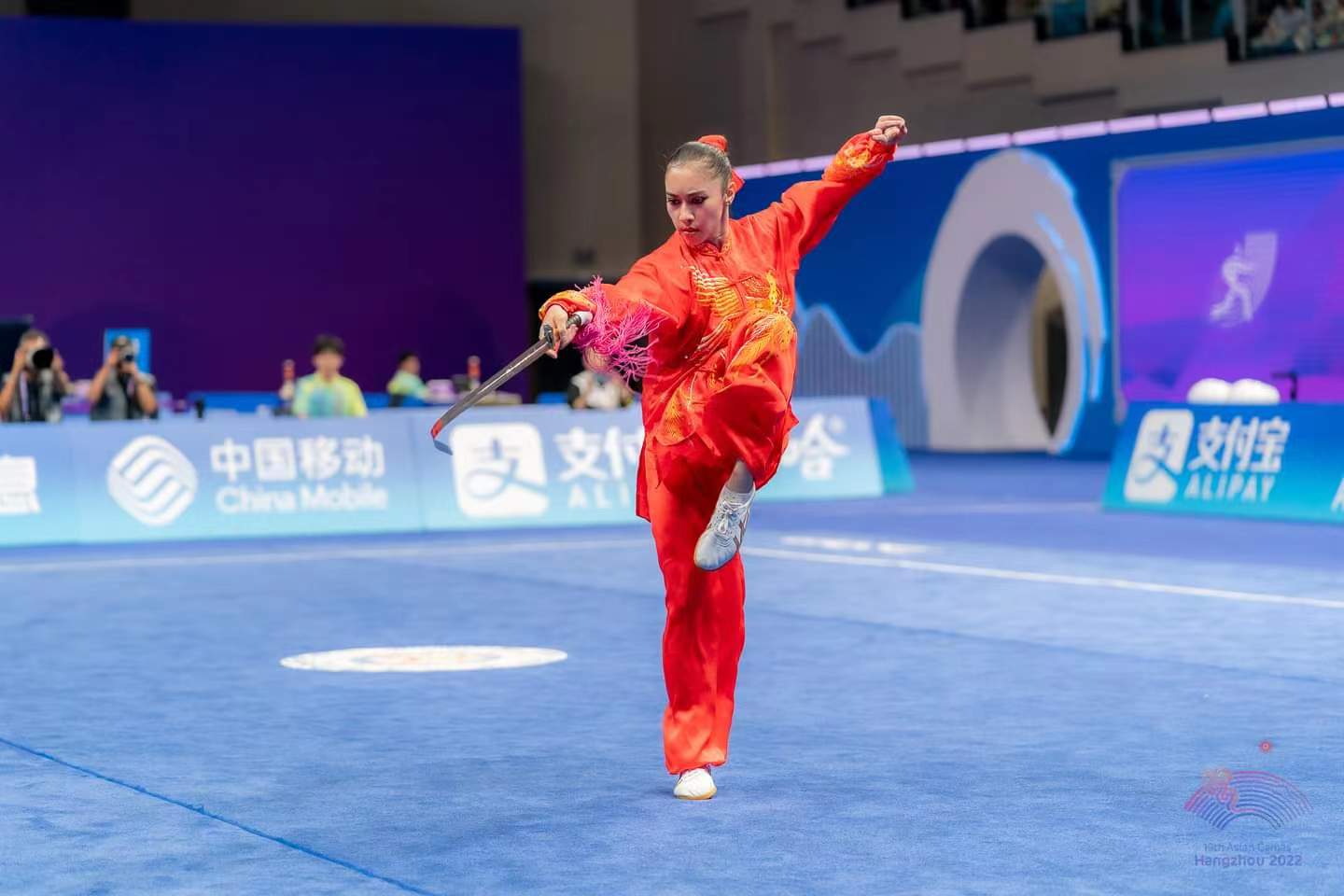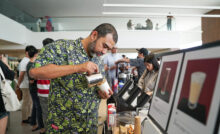BiG Talk : A Wu Shu Way of Life


Written by Jia Ying Chia |
For Basma Lachkar, WuShu is more than just a sport. Her dreams of becoming a professional athlete buck the trend of traditional female roles in Brunei, and with the support of her parents, the Brunei-Moroccan has gone from a promising Sports School Student to bonafide professional athlete. As a member of the national WuShu team, she’s made the nation proud, culminating was a slew of podium finishes including Bronze at the 16th World WuShu Championships in Texas, U.S.A, and a historic gold medal at the 2022 World Games. We stopped by to chat with Basma about the kindness, and being a sportswoman in Brunei.
You stepped into WuShu when you were fairly young. What drew you to trying the sports and why do you think you’ve held an interest in it as long as you have?
BASMA LACHKAR: I’ve been doing it for so long, it’s kind of like a part of my identity now? Growing up with WuShu, I’ve come to understand the sport, its philosophy, and I feel the movements are like a part of me. It’s really hard for me to think easily letting go of the sport. I can’t really describe what made me hold on to training in it for so long, it was just kind of natural, I guess.
I started it as a CCA in Chung Hwa because my mum asked me to and because my brother was already there. He’s also passionate about WuShu and was invited to go to the Sports Complex in Menglait, where all the national team trains. So i’d watch him and the other seniors as well, while waiting. It was interesting, the jumping and flipping in their routines. I started to join in and then it was small competitions until 2017 when I started going for bigger events. That’s when I met my coach.
How do you keep yourself motivated and focused, especially when you’re at the age where most in their 20’s are keener on going out and partying?
BASMA LACHKAR: I went to the Sports School for high school and we usually have a full day pf sport and study. The people around me, they didn’t really go out as well. We understood and supported each other. It’s like, being in that kind of environment, we don’t really get influenced by people in other schools who go out with their friends and all. When we’re in school, that’s when we talk about things, about how hard training or school is. Even the teachers are really kind. They’re very flexible, they don’t really give us many tasks — I went to Jerudong International School after that and so the teachers are not really used to having athletes, I guess, so they just give the normal amount of work for students.
I think the Sports School teachers are really helpful in terms of supporting our mental health as well, because we have to perform consistently. I mean personally, I don’t really use motivation as my tool because it’s a very short-term thing to me. Sometimes it goes up and down and I understand that — our body is not the same as a man’s. There aren’t many female athletes and it’s really hard mentally because I see that they’re being consistent but I’m just at the level at times.
Speaking of the mental health aspect, do you think you’ve learned to be kinder to yourself? Since you said that, there can be a difference sometimes in professional performance when you’re not really physically feeling your best and men don’t really have to go through that?
BASMA LACHKAR: Yeah, definitely. At first, I didn’t understand because I started WuShu very young but as girls grow older and hit puberty, we get periods and it’s not the same anymore. I had to learn it the hard way, because nobody really told us about this kind of stuff and my seniors retired when I started training professionally so there wasn’t really anyone there to give us advice either. Right now, I’m not gonna lie, I’m still in that stage though, of taking care of myself. Sometimes, I’m kind to myself but other times I just have to be hard on myself because laziness comes.
You’ve credited your coached for helping you get where you are today. What’s a piece of advice they’ve given that has been a really important message for you?
BASMA LACHKAR: There’s a lot, sometimes it’s self-conscious. Coach Li and Coach Zhao give different advices because it comes from a man and a woman’s perspective. I remember Coach Li always say, “How much you give, is how much you receive.” I know that’s true and shows that there’s no shortcuts or you can’t just jump to the top.
Coach Zhao, she gives a lot of good advices. She’s like a mother to me, I guess, and her presence just gives me comfort. She doesn’t have to say anything to me — I just want to see her when I compete and the feeling of anxiety is not as high. I think she just wants me to enjoy my performance. That’s her advice to me, because she doesn’t want to look back and forget that I enjoyed competing.
I wanted to do something different for my career and to get paid as an athlete. It didn’t seem possible at first but I’m not losing hope. I think that with our medals and accomplishments, it really helps to make that possible.
You spend a lot of time away traveling and outdoors — do you consider yourself adventurous or do you secretly enjoy being a homebody?
BASMA LACHKAR: I can be both, I guess? Most of the travelling I’ve done was for sport. We always go for a month’s worth of training in China, and I’ve been doing that since I was 12 years old. But every years I got to know people better in China since we always went to the same place. We’ve built a kind of friendship and learned together so it’s easier for me to mingle with them and learn their culture in that way. I guess that’s when I started to like traveling because there is a lot of things I can learn from being away.
It’s probably accurate to say you’ve experienced more of the world than most Bruneians. Do you have any favourite destinations or memorable moments from training that has stuck with you?
BASMA LACHKAR: I’d say, training at my coach’s hometown. That was my first overseas training place and it has slowly become a second home to me. I would start going to my coach’s parents’ house and eat dinner together. The people around there, like even the restaurants, they’ve been around there for so long and we see each other every year. I don’t feel like a foreigner so that’s definitely one of the places that I really enjoy.
Recent Posts
BiG Buzz : Brunei Fertilizer Industries Sdn Bhd (BFI) 2nd International Women’s Day Forum Champions Collective Progress with “Accelerate Action: Together We Rise”
Brunei Fertilizer Industries Sdn Bhd (BFI) successfully convened its 2nd International Women’s Day Forum at…
Immerse in the Spirit of Ramadhan in Brunei
Sponsored by Brunei Tourism As the holy month of Ramadhan graces Brunei, the country transforms…
BiG Buzz : MANTAP Poised to Boost Brunei Food Economy and Security
Written by Aliyah Ming & Ying Chia [gallery size="full" columns="1" ids="25822"] The entry of Mantap…
BiG Buzz : Take Off to Balikpapan with Royal Brunei
[gallery size="full" columns="1" ids="25813"] After a 24-year hiatus, the Brunei-Balikpapan direct flight has made a…
BiG Buzz : 1, 2, 3, KOPI!
[gallery size="full" columns="2" ids="25837,25838,25839,25840"] How much coffee can you drink? Well, at the 7th annual…
BiG Buzz : Grass is Greener Here
[gallery size="full" columns="1" ids="25832"] [gallery size="full" ids="25831,25834,25833"] The importance of sustainability has been a pressing…


